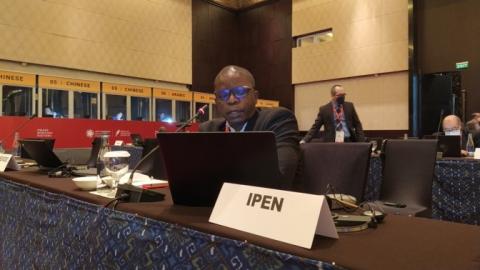Mercury Use Restricted for Dental Amalgam and CFL at COP4

Nusa Dua, Indonesia After difficult and tense negotiations, the Fourth Conference of the Parties (COP) of the Minamata Convention on Mercury agreed that parties shall not allow or shall recommend against the use of mercury based dental amalgam in deciduous teeth, children under 15 and pregnant and breast-feeding women.
This ground-breaking decision, proposed by the African region, is an acknowledgement by global governments that mercury based dental amalgam can impact human health despite decades of industry claims that it is safe.
IPEN representative Gilbert Kuepouo said, “This breakthrough decision, is the beginning of the end of dental amalgam use around the world. There is finally official acknowledgement that mercury fillings can have adverse health effects on women and children. Mercury is a dangerous neurotoxin, and it cannot be justified any longer to place it in the mouth of women and children. While we don’t have a global phase out date yet, this decision means that a full phase out is just a matter of time.”
In other decisions there was agreement that the last category of compact fluorescent lamps (CFL) and cold cathode fluorescent lamps (CCFL) would be phased out by 2025 as LED alternatives are now widely available.
IPEN Mercury and POPs Policy Advisor, Lee Bell, said “This important step forward that reduces global mercury demand, human exposure and prevents hundreds of tonnes of mercury being lost to the environment through broken lamps in landfill or open burned in developing countries.“
A major gap that has not been resolved in the convention is the lack of funding for identifying and cleaning up mercury contaminated sites caused by artisanal and small-scale gold mining. The explosion in this form of gold mining using mercury is rampant in LatinAmerica, Africa, and Southeast Asia.The mercury contaminated sites are poisoning the villagers and building up in the food chain, resulting in dangerously high levels of mercury in women of childbearing age.
IPEN lead on ASGM, Yuyun Ismawati, said, “The Global Environment Facility needs to refocus its funding of the convention toward identifying and cleaning up mercury contaminated sites instead of promoting cyanide use aimed at maintaining gold production and supplies to London, New York and Switzerland. The convention objective is protecting human health not protecting the global gold supply chain."
Contact:
Yuyun Ismawati, yuyun@nexus3foundation.org
Lee Bell, leebell@ipen.org
Gilbert Kuepouo, gkuepouo@gmail.com
